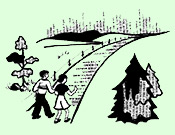
By Lois E. Wilson
I recently met a woman; I’ve had several daily small-talk conversations with her. I considered her a new friend.
She surprised me one day by asking the following question: “Has anything ever happened to you that isn’t bad?”
The question left me almost speechless. I thought it a snide query. I finally responded, “No, I’ve been blessed and have had many positive things happen in my life.”
A Yiddish saying goes, “If you’re out to beat a dog, you’re sure to find a stick.” Criticism can be an observation or judgment which is often false, unfavorable or unfair. In that case it may be the opposite of encouragement.
William Penn observed, “We are apt to be very pert at criticizing others, where we will not endure advice ourselves.” Some critics are often blind to their own personalities and the way they appear to others.
There have been many comments about critics:
“It is much easier to be critical than correct.” (Benjamin Franklin).
“We might every day and every hour say something of another that we might more properly say of ourselves could we but apply our observations to our own concerns.” (Montaigne).
“Criticism should not be querulous and wasting, all knife and root-puller, but guiding, instructive, inspiring: a south wind not an east wind.” (Emerson).
The Bible also warns of our being too critical:
“Judge not, that ye be not judged.” (Matthew 7:1}.
Critics abound.
They’re all around.
We wish they’d get a life and not cause so much strife.
I think of myself as a positive person. When I taught school, my goal was to bring out the best in students and others. That meant I always tried to make any criticism constructive and encouraging toward a successful outcome for the receiver.

